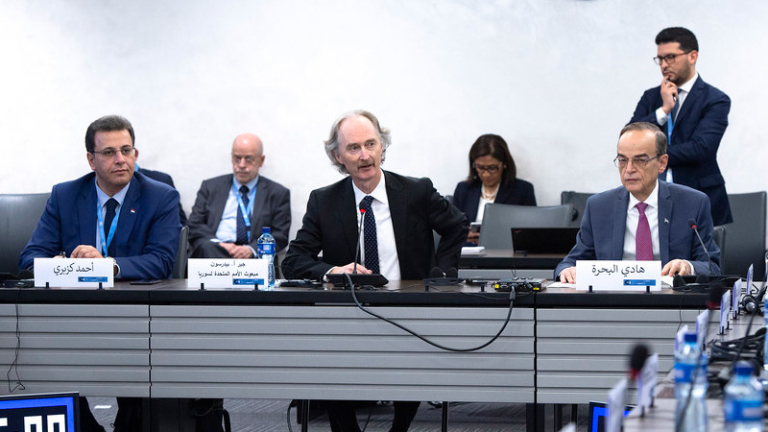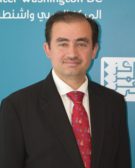
In October 2019, Secretary General of the United Nations António Guterres enthusiastically welcomed the creation of Syria’s Constitutional Committee that would be “Syrian-owned and Syrian-led” to chart a “path out of the tragedy of the Syrian conflict.” Two years later, Guterres’s envoy for Syria, Geir Pedersen, practically announced what could very well be the death of the committee, laying the blame on the Syrian government for the failure of negotiations about amending the constitution. No new date for resumption of negotiations has been set.
The committee was established following a proposal made by Russian President Vladimir Putin, and at the time Guterres thought that Russia was indeed interested in a political process that would include amending the Syrian constitution. After all, Russia had by then become the most important player in Syria following its forceful military intervention in 2015. Guterres thus endorsed the idea and offered Geneva to be the venue for the committee’s meetings that he hoped would help the implementation of United Nations Security Council Resolution 2254 of 2015.
The committee met six times over its two-year existence. It was originally composed of 150 members divided equally among the government, the opposition’s Syrian Negotiations Commission, and civil society groups. A smaller body of 15 members each was tasked with proposing constitutional drafts to be debated and adopted by the larger membership. Thirty percent of members were to be women. But by 2019, the opposition movement had witnessed divisions and disagreements that not only affected its cohesion but also influenced the effectiveness of its proposals.
Like Guterres, the previous UN Special Envoy for Syria, Staffan de Mistura, had also believed that Russia was serious about finding a solution for the Syrian conflict. However, he had been unable to move the resolution forward and resigned in October 2018. Upon taking up his position, Pedersen believed that the Constitutional Committee was the only game in town; but his success was limited to bringing delegates from the government and the opposition to Geneva, where they met six times but could not bridge the large chasm separating their positions. Meanwhile, economic, social, and security conditions for Syrians have deteriorated, indeed worsened at the hands of the regime, which sees no need to provide any concessions on the constitution or any other important matter.
Syrian government representatives in Geneva wasted time in needless discussions about peripheral issues. By the time the committee began its deliberations in October 2019, the regime had established its control over much of the country, except for Idlib province in the northwest and areas in the northeast. With Russian and Iranian help, the regime had subdued opposition areas and practically laid siege to Idlib, which only had an outlet on Turkey to the north. At the last Constitutional Committee meeting, held in October 2021, the regime was only interested in affirming its control over Syria instead of discussing issues that concerned opposition delegates.
With the work of the Constitutional Committee at an impasse, a political solution that would take opposition demands into account is sheer fantasy at this point. Despite the international community’s insistence on Syria’s sovereignty and territorial integrity (which, for all intents and purposes, were violated years ago), Syria today is divided de facto into three areas with three different forms of government. The Syrian regime controls much of the country; a collection of opposition groups, including formerly al-Qaida-affiliated factions, operate in Idlib; and the Kurdish-dominated Syrian Democratic Forces control parts of the northeast.
In addition to regime, opposition, and Kurdish forces on the ground today, Syria hosts Russian, Iranian, US, and Turkish troops. It also hosts Iran-friendly militias from Lebanon, Iraq, Pakistan, and Afghanistan that have pledged to defend the regime and have been instrumental in keeping it in power. On the other hand, Syria’s skies appear to be open to Israel’s air force and missiles that routinely bomb Iranian assets around the country. Current conditions on the ground are a far cry from a few years ago when the country was a virtual battlefield, but the Syrian conflict remains very much alive.
This division of Syria and the presence of foreign troops on its soil call into question the sincerity of the international community’s incessant calls for preserving the country’s sovereignty and territorial integrity. The military nature of the regime’s conduct, and that of its Russian and Iranian backers, makes reaching a political solution difficult if not unachievable. The Russian-sponsored Astana process that helped create the Constitutional Committee may very well have lost its momentum with the collapse of the latter’s talks. Renewed efforts are thus needed by the international community to reassert the importance and necessity of implementing UNSC Resolution 2254, which contains the essence of a political process for resolving the Syrian conflict.

